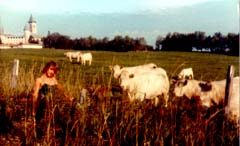"In discussions of ecological philosophy and the mastery of nature, a common point of departure and historical foil has been either the empiricism of Francis Bacon or the rationalism of Rene Descartes, two Renaissance thinkers who developed radically new methods for guiding scientific research and who characterized the natural world in terms of its use-value for or distinctness from humans. Marx, himself, remarked, 'That Descartes, like Bacon, anticipated an alteration in the form of production, and the practical subjugation of Nature by Man, as a result of the altered mehtods of thought, is plain from his Discours de la Methode.' For Bacon, to know nature means to disturb and annoy it (natura vexata) through artisanry and technology so that it will reveal its secrets. With Descrates, the understanding of nature and realization of certainty are achieved first by separation from the natural world, then its precise measurement. In both instances knowledge is premised upon detachment and a thoroughgoing control over the environment and experimental conditions. Coupled with this control is a privileging of the 'how' over the 'why,' which eventuates in a utilitarian criterion of truth, a tendency to transform science into technique, and a reduction of the 'object' of knowledge to an instrumental relation or quantifiable value."(Macauley 3)
In contrast, Macauley writes that "...ecological philosophy counsels an attentiveness to lived place (rather than abstract space), body and matter (not only spirit and mind), changing appearances and phenomena (not simply static essences and noumena), and immanence (along with possible transcendence). It seeks to guide the flight of thought and the thought of flight gently back down to earth without cordoning it there unconditionally." (12)
As you read and think about your relationship to nature, see if your approach to language changes.
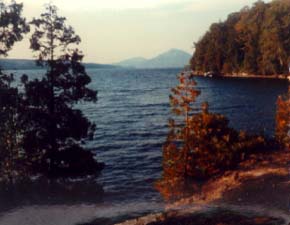 Experiment with poetry and personal writing for your webfolio. Do you agree or disagree with the following statement?
Experiment with poetry and personal writing for your webfolio. Do you agree or disagree with the following statement?
"As long as humankind continues to use language strictly for our own ends, as if it belongs to our species alone, we will continue to find ourselves estranged from our actions. If as Merleau-Ponty's work indicates it is not merely this body but the whole visible, sensual world that is the deep flesh of language, then surely our very words will continue to tie our selves, our families, and our nations into knots until we free our voice to return to the real world that supports it-- until we allow it to respond to the voice of the threatened rainforests, the whales, the rivers, the birds, and indeed to speak for the living, untamed earth which is its home. The real Logos, after Merleau-Ponty, is Eco-logos.
THE SOUL OF NATURE, edited by Michael Tobias and Georgianne Cowan. New York: Penguin Plume Books, 1996. This is a collection of essays written by people from different disciplines all over the world. We will use at least half of these essays to analyse style as well as the different approaches to the theme.
Abram, David. THE SPELL OF THE SENSUOUS.New York: Random House, 1997. This well-written book by a philosopher and ecologist is an excellent example of how to combine the genres of descriptive, expository, personal and argumentative writing with meticulous primary and secondary source research. Use some of his techniques to help you weave your final projects together.
Thoreau, Henry David. "Walking" in THE ART OF THE PERSONAL ESSAY,edited by Philip Lopate. New York: Doubleday, 1994. Read this essay before your next walk in the woods and see how your journal compares to Thoreau's musings more than a century ago, when the woods were a lot cleaner. Can you see how personal essays often provide the seeds for your argumentative researched papers?
Read the following argumentative essays, "It's Time to Privatize," "They're not for Sale," "Promises, Promises," "Reinventing Nature," "The Trouble with Wilderness," "Missing Links," and "A Report from the General Accounting Office" from your packet and write down each writer's thesis and as many logical fallacies of presumption, ambiguity and relevance that you can find. Notice the difference between this informal, business and journalistic writing and the more refined academic and literary styles. Make sure your dress fits the occasion. Who is your audience? What are you trying to accomplish? How do you want to present yourself?
Look through these poems for ideas and imagery about nature:
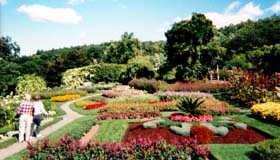
What is a Garden
All day working happily down near the streambed
the light passing into the remote opalescence
it returns to as the year wakes toward winter
a season of rain in a year already rich
in rain with masked light emerging on all sides
in the new leaves of the palms quietly waving
time of mud and slipping and of overhearing
the water under the sloped ground going on whispering
as it travels time of rain thundering at night
and of rocks rolling and echoing in the torrent
and of looking up after noon through the high branches
to see fine rain drifting across the sunlight
over the valley that was abused and at last left
to fill with thickets of rampant aliens
that brought habits but no stories under the mango trees
already vast as clouds there I keep discovering
beneath the tangle the ancient shaping of water
to which the light of an hour comes back as to a secret
and there I planted young palms in places I had not pondered
until then I imagined their roots setting out in the dark
knowing without knowledge I kept trying to see them standing
in that bend of the valley in the light that would come
---W.S. Merwin
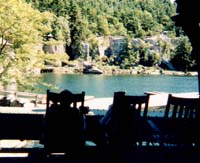 The Cradle Logic of Autumn
The Cradle Logic of Autumn
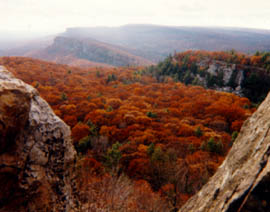
Each instant comes with a price, the blue-edged bill
on the draft of a bird almost incarnadine,
the shanked ochre of an inn that sits as still
as the beavertail cactus it guards (the fine
rose of that flower gone as bronze as sand),
the river's chalky white insistence as it
moves past the gray afternoon toward sunset.
Autumn feels the chill of a late summer lit
only by goldenrod and a misplaced strand
of blackberries; deplores all such sleight-of-hand;
turns sullen, selfish, envious, full of regret.
Someone more adept would mute its voice. The spill
of its truncated experience would shine
less bravely and, out of the dust and dunghill
of this existence (call it hope, in decline),
as here the blue light of autumn falls, command
what is left of exhiliration and fit
this season's unfolding to the alphabet
of turn and counterturn, all that implicit
arc of a heart searching for a place to stand.
Yet even that diminished voice can withstand
the currying of its spirit. Here lies--not yet.
If, and only if, the leafless rose he sees,
or thinks he sees, flowered a moment ago,
this endangered heart flows with the river that flees
the plain, and listens with eye raised to the slow
revelation of cloud, hoping to approve
himself, or to admonish the rose for slight
transgressions of the past, this the ecstatic
ethos, a logic that seems set to reporve
his facility with unsettling delight.
Autumn might be only desire, a Twelvth-night
gone awry, a gift almost too emphatic.
Logic in a faithful light somehow appeases
the rose, and stirs the hummingbird's vibrato.
By moving, I can stand where the light eases
me into the river's feathered arms, and, so,
with the heat of my devotion, again prove
devotion, if not this moment, pure, finite.
Autumn cradles me with idiomatic
certainty, leaves me nothing to disapprove.
I now acknowledge this red moon, to requite
the heart alone given power to recite
its faith, what a cradled life finds emblematic.
---Jay Wright
To Autumn
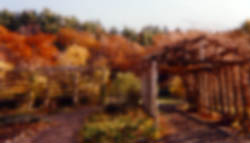
Seasons of mist and mellow fruitfulness,
Close bosom friend of the maturing sun;
Conspiring with him how to load and bless
With fruit the vines that round the thatch-eaves run;
To bend with apples the mossed cottage-trees,
And fill all fruit with ripeness to the core;
To swell the gourd and plump the hazel shells
With a sweet kernel; to set budding more,
And still more, later flowers for the bees,
Until they think warm days will never cease,
For summer has o'er-brimmed their clammy cells.
Who hath not seen thee oft amid thy store?
Sometimes whoever seeks abroad may find
Thee sitting careless on a granary floor,
Thy hair soft-lifted by the winnowing wind;
Or on a half-reaped furrow sound asleep,
Drowsed with the fume of poppies, while thy hook
Spares the next swath and all its twined flowers:
And sometimes like a gleaner thou dost keep
Steady thy laden head across a brook;
Or by a cider press, with patient look,
Thou watchest the last oozings hours by hours.
Where are the songs of Spring? Aye, where are they?
Think not of them, thou hast thy music too--
While barred clouds bloom the soft-dying day,
And touch the stubble plains with rosy hue;
Then in a wailful choir the small gnats mourn
Among the river sallows, borne aloft
Or sinking as the light wind lives or dies;
And full-grown lambs loud bleat from hilly bourn;
Hedge crickets sing; and now with treble soft
The redbreast whistles from a garden-croft;
And gathering swallows twitter in the skies.
---John Keats
Stopping by Woods on a Snowy Evening
Whose woods these are I think I know.
His house is in the village though;
He will not see me stopping here
To watch his woods fill up with snow.
My little horse must think it queer
To stop without a farmhouse near
Between the woods and frozen lake
The darkest evening of the year.
He gives his harness bells a shake
To ask if there is some mistake.
The only other sound's the sweep
Of easy wind and downy flake.
The woods are lovely, dark and deep,
But I have promises to keep,
And miles to go before I sleep,
And miles to go before I sleep.
--Robert Frost
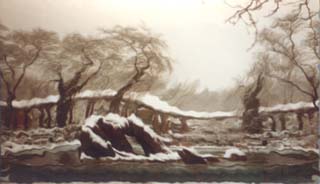 The Snowstorm
The Snowstorm
Announced by all the trumpets of the sky,
Arrives the snow, and, driving o'er the fields,
Seems nowhere to alight: the whited air
Hides hills and woods, the river, and the heaven,
And veils the farm-house at the garden's end.
The sled and traveller stopped, the courier's feet
Delayed, all friends shut out, the housemates sit
Around the radiant fireplace, enclosed
In a tumultuous privacy of snow.
Come see the north wind's masonry.
Out of an unseen quarry evermore
Furnished with tile, the fierce artificer
Curves his white bastions with projected roof
Round every windward stake, or tree, or door.
Speeding, the myriad-handed, his wild work
So fanciful, so savage, nought cares he
For number or proportion. Mockingly,
On coop or kennel he hangs Parian wreaths;
A swan-like form invests the hidden thorn;
Fills up the farmer's lane from wall to wall,
Maugre the farmer's sighs; and at the gate
A tapering turret overtops the work.
And when his hours are numbered, and the world
Is all his own, retiring, as he were not,
Leaves, when the sun appears, astonished Art
To mimic in slow structures, stone by stone,
Built in an age, the mad winds' night-work,
The frolic architecture of the snow.
--Ralph Waldo Emerson
The Negro Speaks of Rivers
I've known rivers: I've known rivers ancient as the world and older than the
flow of human blood in human veins.
My sould has grown deep like the rivers.
I bathed in the Euphrates when dawns were young.
I built my hut near the Congo and it lulled me to sleep.
I looked upon the Nile and raised the pyramids above it.
I heard the singing of the Mississippi when Abe Lincoln
went down to New Orleans, and I've seen its muddy
bosom turn all golden in the sunset.
I've known rivers:
Ancient, dusky rivers.
My soul has grown deep like the rivers.
---Langston Hughes
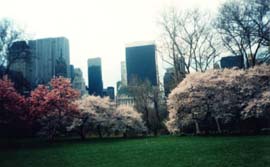
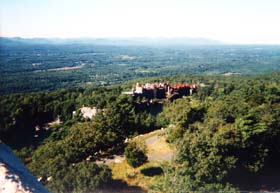
This fragment from "Song of Myself" might stand as Whitman's credo, a credo that glorified the individual voice and united the cosmic with the commonplace, the microcosm and the macrocosm and humans and nature.
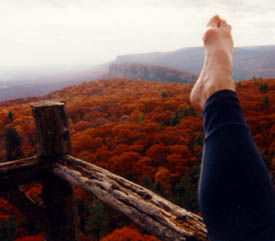
I believe a leaf of grass is no less than the journeywork of the stars,
And the pismire is equally perfect, and a grain of sand, and the egg of the wren,
And the tree-toad is a chef-d'oeuvre for the highest,
And the running blackberry would adorn the parlors of heaven,
And the narrowest hinge in my hand puts to scorn all machinery,
And the cow crunching with depressed head surpasses any statue,
And a mouse is miracle enough to stagger sextillions of infidels.
For William Wordsworth, the contemplation of nature was a religious experience. Do you feel his view of nature in the poem "On the Beach at Calais" is accurate, too romantic, inspiring, similar to your own or completely deluded?
It is a beauteous evening, calm and free;
The holy time is quiet as a nun
Breathless with adoration; the broad sun
Is sinking down in its tranquility;
The gentleness of heaven broods o'er the sea:
Listen! the mighty Being is awake,
And doth with his eternal motion make
A sound like thunder--everlastingly.
Dear child! dear girl! that walkest with me here,
If thou appear untouched by solemn though,
Thy nature is not therefore less divine:
Thou liest in Abraham's bosom all the year,
And worship'st at the Temple's inner shrine,
God being with thee when we know it not.
Wordsworth's pantheism reaches its height in these lines:
One impulse from a vernal wood
May teach you more of man,
Of moral evil and of good,
Than all the sages can.
John Keats writes this credo in a letter to his publisher:
"In poetry I have a few axioms, and you will see how far I am from their centre. First, I think poetry should surprise by a fine excess and not by singularity-- it should strike the reader as a wording of his own highest thoughts, and appear almost a remembrance. Second, its touches of beauty should never be halfway, thereby making the reader breathless instead of content. The rise, the progress, the setting of imagery should like the sun come natural to him-- shine over him and set soberly, although in magnificence, leaving him in the luxury of twilight. But it is easier to think what poetry should be than to write it-- and this leads me to another axiom. That if poetry comes not as naturally as the leaves to a tree it had better not come at all..."
However Keats describes an empty, bleak side of nature in these lines from "The Fall of Hyperion," a work he never finished:
Deep in the shady sadness of a vale
Far sunken from the healthy breath of morn,
Far from the fiery noon, and eve's one star,
Sat gray-haired Saturn, quiet as a a stone,
Still as the silence round about his lair;
Forest on forest hung about his head
Like cloud on cloud. No stir of air was there,
Not so much life as on a summer's day
Robs not one light seed from the feathered grass,
But where the dead leaf fell, there did it rest.
A stream went voiceless by, still deadened more
By reason of his fallen divinity
Spreading a shade: the Naiad 'mid her reeds
Pressed her cold finger closer to her lips.
Similarly, think of the first lines of Robert Browning's "Porphyria's Lover" "The rain set early in tonight;
It tore the elmtops down for spite
And did its worse to vex the lake
I listened with heart fit to break..."
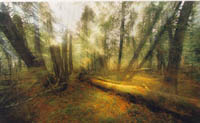
Nature then becomes the ominous background for the murder of his mistress Porphyria.
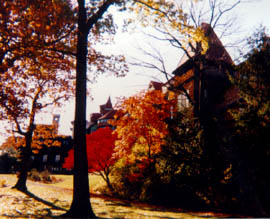
Gerard Manley Hopkins' notebooks are full of meditations about nature:
"I heard the sound of a tree being felled and looking out and seeing it maimed, there came at that moment a great pang, and I wished to die and not to see the inscapes of the world destroyed any more..."
"Sometimes I hear the cuckoo with wonderful clear and plump and fluty notes; it is when the hollow of a rising ground conceives them and palsm them up and throws them out, like blowing into a big humming ewer...""Very hot, though the wind, which was outh, dappled very sweetly on one's face, and when I came out I seemed to put it on like a gown, as a man puts on the shadow he walks into and hoods or hats himself with the shelter of a roof, a penthouse, or a copse of trees. I mean it rippled and fluttered like light linen; one could feel the folds and braids of it-- and indeed a floating flag is like wind visible and what weeds are in a current..."
Nature inspired in Hopkins an original use of meter and rhythm and tone color which breathlessly bursts out in "Hurrahing in Harvest:"
Summer ends now; now, barbarous in beauty, the stooks arise
Around; up abov, what wind-walks! what lovely behavior
Of silk-sack clouds! has wilder, wilful-wavier
Meal-drift moulded ever and melted across skies?
I walk, I lift up, I lift up heart, eyes,
Down all that glory in the heavens to glean our Saviour;
And, eyes, heart, what looks, what lips yet gave you a
Rapturous love's greeting of realer, of rounder replies?
And the azurous hung hills are his world-wielding shoulder
Majestic--as a stallion stalwart, very-violet-sweet!-
These things, these things were here and but the beholder
Wanting; which two when they once meet,
The heart rears wings bold and bolder
And hurls for him, O half hurls earth for him off under his feet.
A good project would be to analyse how different authors have related to the sea in their work. What does Mathew Arnold tell us about his relationship to nature in his poem "Dover Beach," written in 1867?
The sea is calm tonight.
The tide is full, the moon lies fair
Upon the straits;--on the French coast the light
Gleams and is gone; the cliffs of England stand,
Glimmering and vast, out in the tranquil bay.
Come to the window, sweet is the night-air!
Only, from the long line of spray
Where the sea meets the moon-blanched land,
Listen! you hear the grating roar
Of pebbles which the waves draw back, and fling,
At their return, up the high strand,
Begin, and cease, and then again begin,
With tremulous cadence slow, and bring
The eternal note of sadness in.
Sophocles long ago
Heard it on the Aegean, and it brought
Into his mind the turbid ebb and flow
Of human misery; we
Find also in the sound a thought,
Hearing it by this distant northern sea.
The Sea of Faith
Was once, too, at the full, and round earth's shore
Lay like the folds of a bright girdle furled.
But now I only hear
Its melancholy, long, withdrawing roar,
Retreating, to the breath
Of the night-wind, down the vast edges drear
And naked shingles of the world.
Ah, love, let us be true
To one another! for the world, which seems
To lie before us like a land of dreams,
So various, so beautiful, so new,
Hath really neither joy, nor love, nor light,
Nor certitude, nor peace, nor help for pain;
And we are here as on a darkling plain
Swept with confused alarms of struggle and flight,
Where ignorant armies clash by night.
Click hereto return to syllabus. Click hereto return to home page.
